Note: In the United States, today we celebrate Dr. Martin Luther King, Jr Day. Many within our Wesleyan Methodist family observe this holiday in a variety of ways. Today, we share these reflections from voices across multiple Wesleyan Methodist denominations in America.
Note from the Editor: Wesleyan Accent is pleased to share a rich chorus of voices who have answered questions posed in honor of Martin Luther King, Jr Day. Participants considered the following questions:
Growing up, who did you look up to? Who did you want to emulate?
 Growing up, I wanted to emulate my mother. She had such amazing style and strength. She grew up in the segregated South, the daughter of an interracial couple (a black mother and a white father). She was always involved in our community, speaking out on issues, and taking a stand.
Growing up, I wanted to emulate my mother. She had such amazing style and strength. She grew up in the segregated South, the daughter of an interracial couple (a black mother and a white father). She was always involved in our community, speaking out on issues, and taking a stand.
– Rev. Yvette Blair Lavallais, Associate Pastor: St. Luke’s Community UMC, Dallas, Texas
Years ago my uncle, who was a history teacher at Evanston Township high school, had a picture of Dr. King on his wall. And there was a snippet of a quote. “The time is always ripe to do right.” For years that line always stayed in my soul, even when I didn’t really know what it meant. I looked up to my uncle. I would often help him organize all of his classroom papers. He would talk to me about black history. I was always fascinated with the “Eyes on the Prize” series. That’s where I really began to understand the struggle of African Americans in America.
– Rev. Marlan Branch, Pastor: River of Life AME Church, Milwaukee, Wisconsin

I looked up to my grandmother because I thought she was the funniest, hardest working, craziest person ever and all these people that would come to her house or we would run into somewhere genuinely loved her, so I wanted to be her.
-Makayla Burnham, Student Leader: The Wesley Foundation of Wichita Falls, Texas
Definitely my father. He taught me to be proud of who I am as a black man, to work hard, and get an education so that I would not be overlooked for promising opportunities. One of the most valuable lessons learned from my dad was that as a black man in America, I always needed to work twice as hard just to be somewhat equal to my white counterparts; and three times harder to get ahead. But his Christian example in our home and his savvy business sense is why I will always seek to emulate my dad.
-Dr. Kevin Murriel, Senior Pastor: Cliftondale UMC, College Park, Georgia
Growing up, I most wanted to emulate my mother. She showed incredible strength in difficult situations — most notable being a single mother to five girls. No matter what obstacle came her way, she had the strength to overcome it. She was a praying woman and before most people knew anything about a “War Room” my mother had dedicated one room in our house to prayer. I wanted to be like her, a woman of strength and prayer.
-Rev. Karen Bates, MDiv: Alabaster Box Ministry Services, Bowie, Maryland
What is your first memory of the name “Dr. King”?
Because I’m from a rural and conservative hometown in south central Pennsylvania, it was rare to learn about black men and women who were whitewashed from our textbooks outside of home or church. So my first lessons about the Civil Rights Movement and the men and women who led it like Martin Luther King, Clarence Mitchell, Thurgood Marshall, Daisy Bates, Rosa Parks, Joseph DeLaine and so many others were from my Grandmother and Mother. They demanded that I emulate these men and women and commit my life to justice as well. Because of their model, I continue to work to establish and maintain a nonviolent culture on the streets of Rochester, New York where I serve.
– Rev. James C. Simmons, Senior Pastor: Baber AME Church, Rochester, New York
I don’t remember the year that I first learned about Dr. King, but I do remember the story that surrounded the introduction. I vividly recall the time my dad, a United Methodist pastor, told me about his first time being confronted with “Whites Only” drinking fountains and restrooms while on a road trip during his years at Wesley Theological Seminary. The year was 1961 and my dad was returning to Washington, DC from spring break in Florida when he stopped at a gas station to use the restroom. Appalled at the condition of the restroom, my dad complained to the service attendant. “That restroom is a mess,” he reported. “It is?” replied the attendant. “Oh, you went in the wrong restroom. That is for ‘Colored People.’ You were supposed to go into the ‘Whites Only’ restroom.”
spring break in Florida when he stopped at a gas station to use the restroom. Appalled at the condition of the restroom, my dad complained to the service attendant. “That restroom is a mess,” he reported. “It is?” replied the attendant. “Oh, you went in the wrong restroom. That is for ‘Colored People.’ You were supposed to go into the ‘Whites Only’ restroom.”
Raised as a farm boy in rural Pennsylvania, my dad had never been exposed to “Colored Only” restrooms or “Whites Only” water fountains. My dad’s traveling companion from seminary counseled my dad to just get back in the car and forget about the ugly experience. No such luck. In no uncertain terms, my dad made it clear to the attendant that the conditions of the restrooms were inexcusable and that the restrooms should be open to all men. My dad’s scolding may have only had a temporary effect on the attendant who grew up in a segregated culture, but that lesson was etched deeply into my soul.
– Steve Beard, Editor-in-Chief: Good News magazine
My first memory of the name Dr. King was from a movie that’s called, “Our friend, Martin” and I thought the man speaking gave great speeches – but I also thought at a young age, from that movie, that Dr.King really liked walking!
– Makayla Burnham
My earliest memory of Dr. King is when I was four years old attending preschool at Bethel AME. I was born the year after King was assassinated. Our church wanted to make sure we knew who King was and what he stood for. Back then, TV went “off” every night around 11 pm and each station would play excerpts from Dr. King’s “I Have A Dream” speech.
– Rev. Yvette Blair Lavallais
My first memory of the name Dr. King was in church. Each year we had to recite a speech during Black History Month and our Sunday school teachers made sure we knew about the significant contributions of Dr. King and others to American history. Church taught us things about the Civil Rights Movement and its heroes that our school system never took the time to teach us.
– Dr. Kevin Murriel
If you could do one thing in the next year to impact national and international race relations, what would it be?
The one area of national race relations that I hope to impact this year is helping people  understand that Black Lives Matter is not about race, but about justice. Until all lives are given the same value, there is an inequality that exists in this nation and it must be addressed. We have to understand that it is a continuation of the work of Dr. King and a reminder that all men are created equal. Until the scales of justice balance, there is work to do.
understand that Black Lives Matter is not about race, but about justice. Until all lives are given the same value, there is an inequality that exists in this nation and it must be addressed. We have to understand that it is a continuation of the work of Dr. King and a reminder that all men are created equal. Until the scales of justice balance, there is work to do.
-Rev. Karen Bates
 If there was one area of national or international race relations I could directly impact this year, it would be the attitude of evangelical Christians towards immigrants and refugees. My feeling is that much of the anti-immigrant and anti-refugee sentiments that came from many Christians this past year (especially in Facebook posts!) finds its origin in racism. While many of these Christians claim they just want to keep America safe, ironically the best thing they could do to make America safe is by showing love to our “enemies” (people different than us). I love this quote from Martin Luther King, Jr.: “Love is the only force capable of transforming an enemy into a friend.” If Americans were to feed, clothe, and educate Muslims around the world, it would be a lot harder for IS to recruit them to harm Americans!
If there was one area of national or international race relations I could directly impact this year, it would be the attitude of evangelical Christians towards immigrants and refugees. My feeling is that much of the anti-immigrant and anti-refugee sentiments that came from many Christians this past year (especially in Facebook posts!) finds its origin in racism. While many of these Christians claim they just want to keep America safe, ironically the best thing they could do to make America safe is by showing love to our “enemies” (people different than us). I love this quote from Martin Luther King, Jr.: “Love is the only force capable of transforming an enemy into a friend.” If Americans were to feed, clothe, and educate Muslims around the world, it would be a lot harder for IS to recruit them to harm Americans!
– Rev. Daniel Szombathy, Senior Pastor: Journey Church, Robinson, Illinois
One area of race relations that I probably could impact this year would be awareness of an individual’s culture, religion, or background, so there’s a level of accountability to respect another person’s history.
-Makayla Burnham
One area of race relations that I’d like to directly impact is the disparity in our educational system. Hispanic and African American students in lower socioeconomic neighborhoods often are not exposed to the same textbooks, learning opportunities, and academic information as their white counterparts. Just because children are on the free or reduced lunch program does not mean they should be treated with reduced learning opportunities. I’d like to see intentional investment in the academic excellence of all students regardless of race, ethnicity and socioeconomic status.
– Rev. Yvette Blair Lavallais
“The time is always ripe to do right” – that quote is really where I wish I could get people to be gin to work out, especially in race relations: there are so many on both sides who know the truth but for whatever reason choose to stay silent and not speak. I dream for the Beloved community, the community that King began to speak of right before his death. We will not heal as a people until we believe that we are all God’s creation, equal in potential and promise and presence.
gin to work out, especially in race relations: there are so many on both sides who know the truth but for whatever reason choose to stay silent and not speak. I dream for the Beloved community, the community that King began to speak of right before his death. We will not heal as a people until we believe that we are all God’s creation, equal in potential and promise and presence.
– Rev. Marlan Branch
There are many areas of concern, but I truly want to help the Church better understand its role in racial reconciliation. The Church should be leading the effort towards greater race relations. It is the prophetic voice of the Christian collective that has the power to transform the world following the example of Christ. My personal mission and commitment is to keep this perspective in front of the people of God in hopes that our culture of racism and prejudice will change as the Church stands for what is righteous.
-Dr. Kevin Murriel
This originally appeared on Wesleyan Accent in 2016.
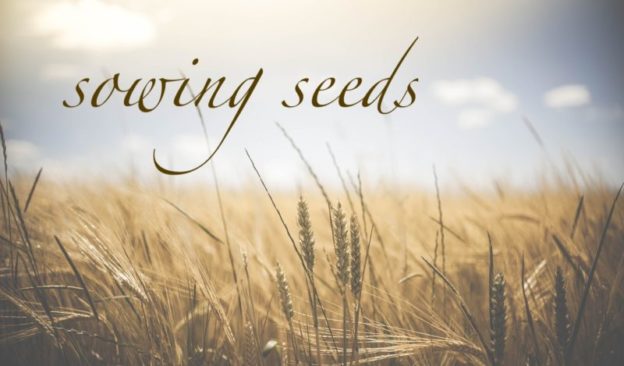
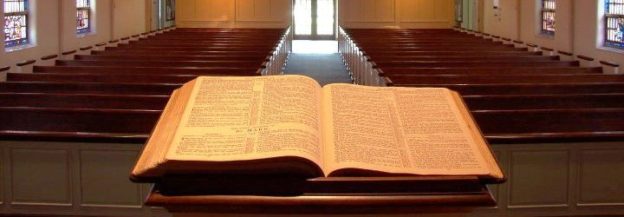

 I come from a long line of artists. My grandfather was an artist; my mother and sister are artists. I am NOT an artist. I enjoy making jewelry, but it would be a huge stretch to call what I do art.
I come from a long line of artists. My grandfather was an artist; my mother and sister are artists. I am NOT an artist. I enjoy making jewelry, but it would be a huge stretch to call what I do art.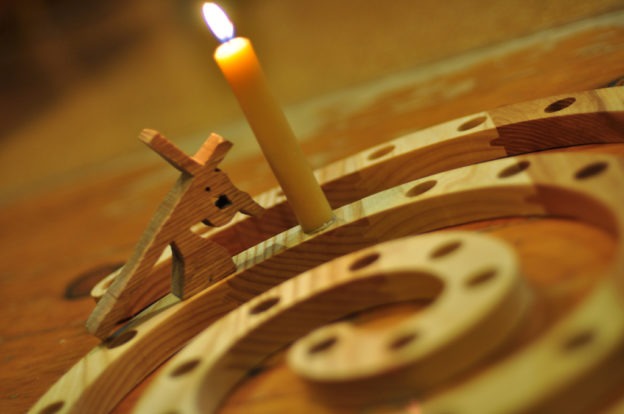
 The long days of Lent can try our self-discipline, stir our irritation, and draw us to parts of our souls we’d rather not visit. Such is the uncomfortable way of the cross. Our ashes have been washed off, but we are not yet living the sacred moments of Holy Week; we are not yet finding the tomb empty. If there is an awareness of a tomb, it’s our own inner lives that echo the reality Jesus spoke of: painted fresh on the outside, rotting decay on the inside.
The long days of Lent can try our self-discipline, stir our irritation, and draw us to parts of our souls we’d rather not visit. Such is the uncomfortable way of the cross. Our ashes have been washed off, but we are not yet living the sacred moments of Holy Week; we are not yet finding the tomb empty. If there is an awareness of a tomb, it’s our own inner lives that echo the reality Jesus spoke of: painted fresh on the outside, rotting decay on the inside. E. Stanley Jones & Sharing the Good News in a Pluralistic Society is a new volume exploring the significance of the famous missionary’s work. WME Executive Director, Dr. Kimberly Reisman, and WME Associate Director of Education and Leadership Development, Dr. Rob Haynes, have both contributed chapters to this compelling new work. Find it on Amazon
E. Stanley Jones & Sharing the Good News in a Pluralistic Society is a new volume exploring the significance of the famous missionary’s work. WME Executive Director, Dr. Kimberly Reisman, and WME Associate Director of Education and Leadership Development, Dr. Rob Haynes, have both contributed chapters to this compelling new work. Find it on Amazon  Recently Dr. Rob Haynes, Associate Director of Education and Leadership Development, was presented with the Dissertation of the Year award by the Wesleyan Theological Society for his work entitled, “Consuming Mission,” completed at the University of Durham in Durham, England. Dr. Haynes joined WME in 2017 and is leading the Convergence trip to England this summer. Congratulations, Rob!
Recently Dr. Rob Haynes, Associate Director of Education and Leadership Development, was presented with the Dissertation of the Year award by the Wesleyan Theological Society for his work entitled, “Consuming Mission,” completed at the University of Durham in Durham, England. Dr. Haynes joined WME in 2017 and is leading the Convergence trip to England this summer. Congratulations, Rob!
 Matt LeRoy ~ Radical Disciple Making
Matt LeRoy ~ Radical Disciple Making Tammie Grimm ~ Why Pilgrimage is Part of Discipleship: Discovering Lindisfarne
Tammie Grimm ~ Why Pilgrimage is Part of Discipleship: Discovering Lindisfarne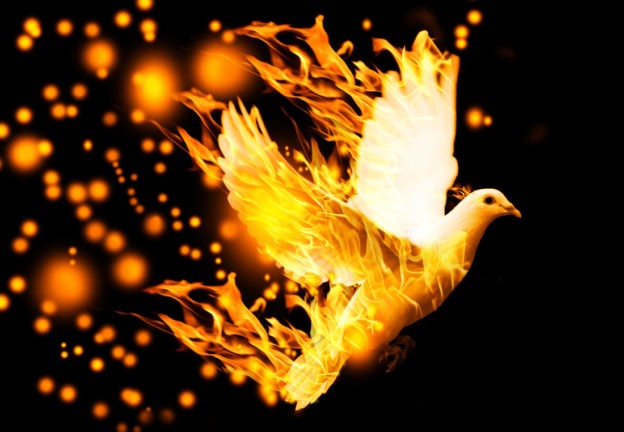

 Pete is the Associate Professor of Evangelization in the Heisel Chair and the Director of Non-Degree Programs at United Theological Seminary in Dayton, Ohio. He teaches in the areas of Church Renewal, Global Charismatic Studies, Missiology, Evangelism, Intercultural and Interreligious Encounter, Urban Studies and Pastoral Care and Counseling.
Pete is the Associate Professor of Evangelization in the Heisel Chair and the Director of Non-Degree Programs at United Theological Seminary in Dayton, Ohio. He teaches in the areas of Church Renewal, Global Charismatic Studies, Missiology, Evangelism, Intercultural and Interreligious Encounter, Urban Studies and Pastoral Care and Counseling. Roz leads a consulting group for church planters/pastors called Picardo Coaching LLC and is the author of Embrace: A Church Plant That Broke All the Rules (Pickwick Publications), Ministry Makeover: Recovering a Theology of Bivocational Ministry (Wipf & Stock Publishers) and Funding Ministry with Five Loaves and Two Fishes (Abingdon Press).
Roz leads a consulting group for church planters/pastors called Picardo Coaching LLC and is the author of Embrace: A Church Plant That Broke All the Rules (Pickwick Publications), Ministry Makeover: Recovering a Theology of Bivocational Ministry (Wipf & Stock Publishers) and Funding Ministry with Five Loaves and Two Fishes (Abingdon Press).
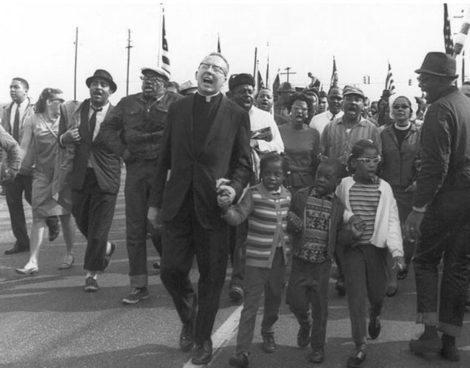


 spring break in Florida when he stopped at a gas station to use the restroom. Appalled at the condition of the restroom, my dad complained to the service attendant. “That restroom is a mess,” he reported. “It is?” replied the attendant. “Oh, you went in the wrong restroom. That is for ‘Colored People.’ You were supposed to go into the ‘Whites Only’ restroom.”
spring break in Florida when he stopped at a gas station to use the restroom. Appalled at the condition of the restroom, my dad complained to the service attendant. “That restroom is a mess,” he reported. “It is?” replied the attendant. “Oh, you went in the wrong restroom. That is for ‘Colored People.’ You were supposed to go into the ‘Whites Only’ restroom.” understand that Black Lives Matter is not about race, but about justice. Until all lives are given the same value, there is an inequality that exists in this nation and it must be addressed. We have to understand that it is a continuation of the work of Dr. King and a reminder that all men are created equal. Until the scales of justice balance, there is work to do.
understand that Black Lives Matter is not about race, but about justice. Until all lives are given the same value, there is an inequality that exists in this nation and it must be addressed. We have to understand that it is a continuation of the work of Dr. King and a reminder that all men are created equal. Until the scales of justice balance, there is work to do.
 gin to work out, especially in race relations: there are so many on both sides who know the truth but for whatever reason choose to stay silent and not speak. I dream for the Beloved community, the community that King began to speak of right before his death. We will not heal as a people until we believe that we are all God’s creation, equal in potential and promise and presence.
gin to work out, especially in race relations: there are so many on both sides who know the truth but for whatever reason choose to stay silent and not speak. I dream for the Beloved community, the community that King began to speak of right before his death. We will not heal as a people until we believe that we are all God’s creation, equal in potential and promise and presence.